How to Learn a Foreign Language through Translation
how to learn a foreign languagePPT课件

Goal
• To provide basic information necessary for a clear understanding of the “true” nature of learning a second language.
2
Quote
• “ A man who does not know a foreign language does not know his own.” ---Goethe
stored in long term memory; a structure 60 times • The Parts of Language Make the Whole • Repetition is the “Mother” of all Learning
11
Second Language Acquisition
8
General Reasons People Learn a Second Language…
• Personal • Professional • Social • Educational
9
What do People Generally Speak About?
• Family • Business • Personal Care • Travel • Food
• An understanding of second language acquisition can improve the ability of mainstream teachers to serve the culturally and linguistically diverse students in their classrooms (Fillmore & Snow, 2002; Hamayan, 1990). While significant professional development is necessary to gain a full understanding of second language acquisition theory, some key concepts can be quickly understood and applied in the classroom.
I单选
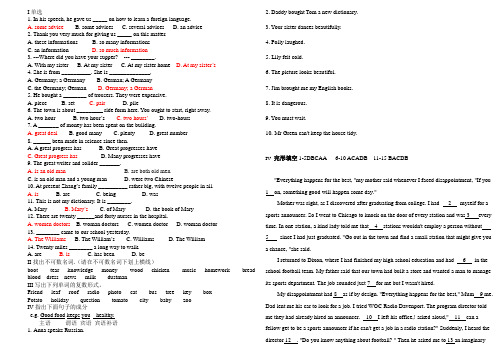
I单选1. In his speech, he gave us _____ on how to learn a foreign language.A. some adviceB. some advicesC. several advicesD. an advice2. Thank you very much for giving us _____ on this matter.A. these informationsB. so many informationsC. an informationD. so much information3. ---Where did you have your supper? --- ________.A. With my sisterB. At my sisterC. At my sister homeD. At my sister’s4. She is from __________. She is ______________.A. Germany; a GermanyB. German; A GermanyC. the Germany; GermanD. Germany; a German5. He bought a ________ of trousers. They were expensive.A. pieceB. setC. pairD. pile6. The town is about _________ ride form here. You ought to start, right away.A. two hourB. two hour’sC. two hours’D. two-hours7. A _______ of money has been spent on the building.A. great dealB. good manyC. plentyD. great number8. ______ been made in science since then.A. A great progress hasB. Great progresses haveC. Great progress hasD. Many progresses have9. The great writer and solider _______.A. is an old manB. are both old menC. is an old man and a young manD. were two Chinese10. At present Zhang’s family __________ rather big, with twelve people in all.A. isB. areC. beingD. was11. This is not my dictionary. It is ________.A. MaryB. Mary’sC. of MaryD. the book of Mary12. There are twenty ______and forty nurses in the hospital.A. women doctorsB. woman doctorsC. women doctorD. woman doctor13. ________ came to our school yesterday.A. The WilliamsB. The William’sC. WilliamsD. The William14. Twenty miles ________ a long way to walk.A. areB. isC. has beenD. beII找出不可数名词.(请在不可数名词下划上横线)boot tear knowledge money wood chicken music homework bread blood dress news milk dustmanIII写出下列单词的复数形式。
英语B

三峡大学成人教育2012至2013学年度一学期考试试卷(B 卷)一、选择填空(请把答案填写在答题卡)(1×45)㈠选择一个与其它三个发音不用的选项1、A、perhape B、thank C、ate D、active2、A、rare B、are C、stare D、prepare3、A、scene B、sense C、engineer D、chemist4、A、knew B、review C、sew D、news5、A、dead B、peasant C、weather D、greatly6、A、burn B、bury C、nurse D、hurt㈡选择正确的答案7、In his speech. He gave us on how to learn a foreign language.A、Some adviceB、some advicesC、several advicesD、an advice8、She is from she is .A、Germany;a GermanyB、German;a GermanyC、the Germany;GermanD、Germany;a German9、A of money has been spent on the bullding.A、great dealB、good manyC、plentyD、great number10、The great writer and solider .A、is an old manB、are both old menC、is an old man and a young manD、were two Chinese11、Came to our school yesterday.A、THE WilliamsB、The William’sC、WilliamsD、The William12、Don’t play with these sharp ,Tom.A、knifeB、knifesC、kniveD、knives13、The elephant is useful animal,isn’t it?A、aB、anC、thatD、one14、My uncle lives in Chaoyang street.A、theB、aC、anD、/15、is the largest of the continent of the world.A,Asia B,An Asia C,A Asia D,The Asia16、Miss Brown had -----hand out the test paper .A、he and me B,him and I C,he and I D,him and me17、Your car isn’t fast .Please take ----- .A、my one B, my C,me D,mine18、I don’t like the colour of the coat .Show me ----,please.A、anotherB、the othersC、otherD、an another one19、Through walk, he arrived at the village.A、two—hoursB、two hoursC、two—hourD、two—hours20、“325” is read jn English asA、three hundred twenty—riveB、three hundred and twenty—fiveC、three hundreds and twenty—fiveD、three hundred and twenty five21、My little brother is a lovely boy.A、six—year—oldB、six—years—oldC、six—yearD、six—year old22、she practised, she read.A、Longer,betterB、The longer,betterC、The longer,the betterD、Longer;the better23、“Can you ask your neigbours for help?”“I’m afraid not, I know them.”A、hardlyB、onlyC、jastD、seldom24、There is a tree in front of the biulding.A、tall,tallB、high,highC、high,tallD、tall,high25、I received a letter from America March 8th .A、atB、inC、onD、to26、Beijing has changed a great deal the past five years.A、inB、sinceC、fromD、for27、His attitude me wasn’t a comrade.A、to,that ofB、to,likcC、at,likcD、at,that of28、He will certainly be given a new house if more new houses next year.A、will be builtB、are builtC、will builDD、be built29、How many English words by the end of last year?A、have you learnedB、did you learnedC、will you learnD、had you learned30、When water ,is will be changed into vapour.A、is heatedB、was heatedC、will be heatedD、would heated31、When did you last write to Peter? Oh,I to him for ages.A、didn’t writeB、don’t writeC、wasn’t writingD、haven’ written32、The visitor came in, by a group of young men.A、followedB、followingC、followD、having followed33、Do you know who repaired the bench? I’m not sure. it be Li Hai?A、MustB、CouldC、ShouldD、Would34、I be here at eight tomorrow morning?No,you .The meeting will begin at nine.A、Must,mustn’tB、Must,needn’tC、Shall,musn’tD、Need,can’t35、Could you tell me if it tomorrow?A、is rainingB、rainsC、should rainD、will rain36、They not to make so much noise at this time of night.A、shouldB、oughtC、mustD、need37、their hands,the children sat down to supper.A、Being washedB、Having washedC、WashedD、Washing38、The building there is a school.A、builtB、buildingC、to builtD、beingt built39、The young woman couldn’t decide ,Let’s go and help her.A、to do whatB、doing whatC、what to doD、how do that40、The sun shines brightly in the sky, us light and heat.A、giveB、givesC、givingD、and give41、You and your father are going to the factory, ?A、do theyB、do youC、aren’t theyD、aren’t you42、Hurry up, we’ll be late for the conference.A、andB、forC、soD、otherwise43、Please speak louder we can hear more clearly.A、forB、becauseC、asD、so that44、She acted nothing had happened to her.A、as ifB、asC、whenD、if45、Difficulties are nothing you are not afraid of them.A、forB、asC、ifD、whether二、完形填空Psaaage 1A habit is something we do very often,We do not think when we are doing it,We can have 46 habits or bad hadits.This article give some advice 47 how to be healthy.It tells you 48 you must do if you want to be 49 ,It also tells you what you must not do.It talk about good habits 50 bad habits.Early to bed,early to rise,makes a man healthy,wealthy and wise.This is an old English 51 ..Have you heard it before? It 52 that we must go to be early and 53 early in the morning.If we do,we shall be healthy.we shall also be rich(wealthy) and 54 (wise).It this true? Perhaps it is.The body must have 55 sleep.If you do not go to bed early, you cannot have enough sleep. 56 you cannot think properly and you cannot do your work properly.You will 57 be wise and you may not become wealthy!Some people go to bed late at night and get up late in the morning.This is not good for them.We must sleep 58 night when it is dark.The dark help us to sleep properly.When the 59 comes,we must get up This is the time for exercise.Exercise means doing things with body.Walking,running,swimming,playing games are all exercise.If the body is not used,it becomes 60 .Exercise keeps it strong.It help the 61 to move around inside the body,Blood takcs food to all 62 of the body,The brains in our 63 also need blood.We think with our brains.If we keep our bodies 64 ,and get exercise,we 65 think better.46、A、no B、good C、some D、many47、A、on B、for C、at D、to48、A、how B、when C、why D、what49、A、fit B、health C、wise D、good50、A、in B、of C、and D、with51、A、saying B、sentence C、poem D、words52、A、is B、means C、is said D、shows53、A、stay up B、wake up C、go to school D、get up54、A、tidy B、dean C、clever D、brave55、A、little B、enough C、plenty D、many56、A、Then B、Because C、If D、But57、A、not B、certainly C、have to D、surely58、A、in B、at C、on D、throughout59、A、night B、time C、daylight D、dark60、A、good B、healthy C、fit D、weak61、A、blood B、air C、food D、brains62、A、part B、parts C、port D、ports63、A、heads B、head C、eyes D、body64、A、healthy B、healthy C、strongly D、health65、A、need B、must C、ought D、can三、阅读与理解(2×15=30分)A house in which there were a lot of guests was suddenly on fire at mldninght.The guests rushed outside when they heard the alarm(警报).They did not even have time to put on their clothes. Covered with blankets and overcoats.they were standing and watching the flame (火焰) when Mr While,who was another guest,joined them.“Why did you get so excited?” Mr White asked,“Now look at me,When I heard the alarm,I got out of bed,lighted a cigarettee (香烟) and guietly dressed myself.In fact I was putting on my tie and thought it was not the best tie to wear with the shirt I had on,So I took it off and put on another.I didn’t lose my head at all.I never get excited before danger or difficulty.”“That’s good,” said one of his friends.“But why didn’t you put on your trousers? And all the others lau ghed.”66、A fire broke out in the house .A、in the middle of the dayB、in the eveningC、in the middle of the nightD、early in the morning67、After they heard the alarm, guests .A、put on their clothesB、rushed out of the houseC、stood watching the flameD、ran here and there68、The guests were in such a hurry to rush out that they had no time to .A、Put on their clothesB、take off their clothesC、cover themselves with blanketsD、put on thair overcoat69、Why did “all the others” laugh?A、Because one of the guests praised Mr.White.B、Because one of the guests laughed about firstC、Because one of the guests exposed(揭露) Mr White’s trud colours.D、Because one of the guests asked a silly questionPassage 2Why does pouring hot water over a tight pot lid loosen it? Hot water makes the metal of the pot lid a llttlc larger in size;this makes the lid loose.Most objects grow a little larger when heated because they are make up of molecules(分子) that are moving constantly.Heat makes molecules move faster.The hotter the molecules become,the faster they move and thd more space they need.This explains why we hear a hitting sound as we travel by train.The hitting sounds tell us that we are psaaing over the joins(接合处) put in to allow room for the rails to become larger.These joints prevent the rails from bending as they get larger under the hot sun.Like the molecules of the metal pot lid,the molecules of the rails need more space when they are hot.70、Hot waterA、heats whatever is inside the potB、makes the lid slightly largerC、causes the pot to grow smallerD、all of the above71、An object is made up of molecules that moveA、If the objects becomes very hotB、whenever hot water is poured over itC、all the timeD、Only when the objeets is becoming larger72、Objeets grow larger when they are hot because hot molecules .A、move fasterB、take up more roomC、move slowlyD、both A and B73、From this passage we can see that the molecule in rails .A、act like those in lid and other objectsB、Are not much like theose in a pot lidC、will not become larger even in the hot sunD、are like not another moleculesPassage 3It is only during the last few years that man has generally realized that in the world of nature a balance(平衡) exists between all form of life.No living thing can exist by itself,it is a part of a system(体系)in which all forms of life are joined together.If we change one part of the nature order,this will in its turn almost certainly bring about changes in some other parts.The cutting down of forests reduces the supply of oxygen.The killing of weeds and insects by chemicals leads to the wide spread poisoning animals and birds.The throwing of waste products into the ocean does harm to life in the sea,while waste gsaes change the chemical balance of the atmosphere.And so we could go on adding more examples,until in despair(绝望)we might feel like giving up the struggle to control and keep within limits these harmrul human aclivities.Man is very clever at Changing the world around him to satisfy his immediate needs,but not so clever at looking far ahead or at thinking about what the future result of his action might be.74、The first paragraph mainly tells us that .A、everything in nature can’t exist without the help of human beingsB、no living thing can exist naturallyC、all living things in nature depend no each otherD、man has well-know the importance of the balance of nature for a long time75、The examples given in the second paragraph are used to prove that .A、it is very important to protect forestB、there are some living things which can exist all by themsewes without changeC、all forms of life belong to a system in which all the parts can be changed for one anotherD、we can’t change one form of life or matter without disturbing(扰乱)the balance of nature76、In the second paragraph the word “atmosphere” means .A、the production of chemical factoriesB、the gas in the outer spaceC、the mixture of gases that surrounds the earthD、the health of the human body77、Which of the following may be the best for the title of this article?A、The Secret of NaureB、The Balance of NatureC、The Nature SystermD、The Change of NaturePassage 4We drink tea every day.But more than three hundred years ago most people in Europe did not know anything about tea .Some people had heard about it,but very few of them knew what to do about it.There is a story about English sailor who went to countries in the west,the east and south.He had been to India and China.One day he came home and brought some tea as a present for his mother.She told her friends about the present and asked them to a “tea party”.When her friend ca me to the party.the old wonan brought out some tea-leaves and asked them to eat. Of course,nobody l;iked tea leaves.At that time,the sailor came in.He look at the atble and asked,“Mother,What have you done with the tea?” “I boiled it as you said”,“And what did you do with the water?” “And threw it away.of course.”ansewred the old woman.“Now,you may throw away the leaves,too,”said the sailor.78、The sailor gave his mothersome as a present.A、shipsB、teaC、fishD、money79、The old woman asked her friends to aA、concertB、dinnerC、filmD、tea party80、The old woman kept the leaves kut threw the away.A、tea leavesB、cupC、waterD、rubbish四、完成下面的情境对话(15分)提示:酒吧相遇,Bill问John想喝点什么,John想要杯茶,吃块饼Bill:Hello,John.John:Hello,Bill,Glad to see you here in the bar.Bill:John?John:I don’t know,What do you want to drink?Bill:John:I don’t want coffee.Bill:What would you like to eat?John:Bill:Fine,Do you want a glass of water,too?John:No,五、作文(30分)谈爱好一、选择题答案填写处(1×45)三、阅读与理解(2×15)。
如何学习英语的英语作文(通用33篇)
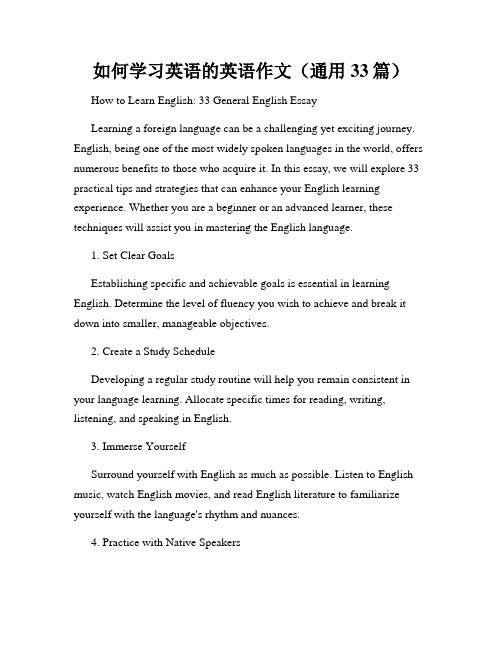
如何学习英语的英语作文(通用33篇)How to Learn English: 33 General English EssayLearning a foreign language can be a challenging yet exciting journey. English, being one of the most widely spoken languages in the world, offers numerous benefits to those who acquire it. In this essay, we will explore 33 practical tips and strategies that can enhance your English learning experience. Whether you are a beginner or an advanced learner, these techniques will assist you in mastering the English language.1. Set Clear GoalsEstablishing specific and achievable goals is essential in learning English. Determine the level of fluency you wish to achieve and break it down into smaller, manageable objectives.2. Create a Study ScheduleDeveloping a regular study routine will help you remain consistent in your language learning. Allocate specific times for reading, writing, listening, and speaking in English.3. Immerse YourselfSurround yourself with English as much as possible. Listen to English music, watch English movies, and read English literature to familiarize yourself with the language's rhythm and nuances.4. Practice with Native SpeakersEngaging in conversations with native English speakers is invaluable in improving your language skills. Join language exchange programs or find language partners online to practice speaking and receive feedback.5. Utilize Online ResourcesTake advantage of the vast number of online resources available for English learners. Websites, mobile apps, and online courses offer interactive exercises, video lessons, and grammar tutorials.6. Use FlashcardsUtilize flashcards to learn new vocabulary words. Write the English word on one side and the translation or definition on the other. Review them regularly to reinforce your memory.7. Read ExtensivelyReading English texts, such as books, newspapers, and magazines, exposes you to various sentence structures and vocabulary. Start with simpler materials and gradually progress to more complex texts.8. Keep a Vocabulary JournalMaintain a vocabulary journal to record new words and expressions. Write down their meanings, synonyms, and example sentences to reinforce your understanding. Review the journal periodically.9. Watch English TV Shows and MoviesWatching English TV shows and movies with subtitles can help improve your listening skills and familiarize you with everyday conversations.10. Take NotesWhen studying English grammar or learning new vocabulary, take notes to reinforce your understanding. Summarize the main points and review them regularly.11. Engage in English-Speaking CommunitiesJoining online forums, social media groups, or language exchange communities allows you to interact with English speakers from around the world. Participate in discussions and ask for advice.12. Enroll in a Language CourseConsider enrolling in a formal English language course, either online or in-person. Qualified teachers can provide guidance, monitor your progress, and offer personalized feedback.13. Practice Speaking AloudSpeak English out loud, even when you are alone. Practice pronunciation, intonation, and rhythm to develop fluency and build confidence.14. Write RegularlyCommit to writing in English regularly. Start with simple sentences and gradually progress to more complex paragraphs and essays. Ask for feedback from native speakers or language teachers.15. Use Language Learning AppsThere are various language learning apps available that offer interactive exercises, games, and quizzes to enhance your English skills. Dedicate a few minutes each day to these apps.16. Study GrammarEnglish grammar can be complex, but understanding its rules is crucial. Study grammar topics systematically and practice applying them in your speaking and writing.17. Test YourselfRegularly assess your language skills by taking practice tests or using online language proficiency assessment tools. Identify areas of improvement and focus on strengthening those areas.18. Develop Listening SkillsListen to English podcasts, audiobooks, or news broadcasts to improve your listening comprehension. Start with slower-paced materials and gradually move on to more challenging content.19. Travel to English-Speaking CountriesImmersing yourself in an English-speaking environment through travel allows you to practice your language skills in real-life situations. Communicate with locals and engage in conversations.20. Make English-Speaking FriendsActively seek out English-speaking friends or join language exchange programs. Regular communication with native speakers accelerates your progress and exposes you to colloquial expressions.21. Use English in Daily ActivitiesIncorporate English into your daily activities. Label items in your home with their English names, think in English, or use English while cooking or doing household chores.22. Participate in Role-Playing ActivitiesEngage in role-playing activities with friends or language partners to simulate real-life conversations. Practice various scenarios, such as ordering food at a restaurant or asking for directions.23. Listen to English MusicListen to English songs and try to understand the lyrics. Sing along to improve your pronunciation and intonation. Look up the lyrics and their meanings to deepen your understanding.24. Attend English Language MeetupsCheck for English language meetups or conversation clubs in your area. These informal gatherings encourage participants to communicate in English and provide an opportunity to make new friends.25. Learn through ContextLearn new vocabulary and expressions in context rather than isolated words. Pay attention to how words are used in sentences and try to understand their meanings through context clues.26. Use English-English DictionariesInstead of relying solely on translation dictionaries, utilize English-English dictionaries to learn new words. This way, you can develop a deeper understanding of their usage and connotations.27. Listen to English RadioTune in to English radio stations or podcasts during your commute or leisure time. This will expose you to natural conversations, various accents, and different topics.28. Join Language Learning ChallengesParticipate in language learning challenges or competitions that encourage daily practice and progress. These challenges often provide a supportive community and motivates you to stay consistent.29. Embrace MistakesDo not be afraid to make mistakes. Making errors is a natural part of the learning process. Embrace them as opportunities for growth and learning.30. Stay MotivatedMaintaining motivation is crucial during the language learning journey. Set rewards for yourself upon reaching specific milestones or find an accountability partner to keep you motivated and focused.31. Practice Speaking in Front of a MirrorStand in front of a mirror and practice speaking English. Observe your facial expressions, gestures, and body language to improve your communication skills.32. Celebrate Your ProgressAcknowledge and celebrate every milestone you achieve in your English learning journey. Reflect on how far you have come to stay motivated and remind yourself of your accomplishments.33. Never Give UpFinally, stay persistent and never give up. Learning a language requires time and effort. Even during challenging times, remember your goals and the benefits of becoming proficient in English.In conclusion, learning English requires dedication, consistency, and a variety of approaches. By implementing these 33 tips and strategies, you can enhance your English language skills and embark on a successful language learning journey. Remember, practice makes perfect, and every step you take brings you closer to fluency. Happy learning!。
Unit1 How to learn a foreign language
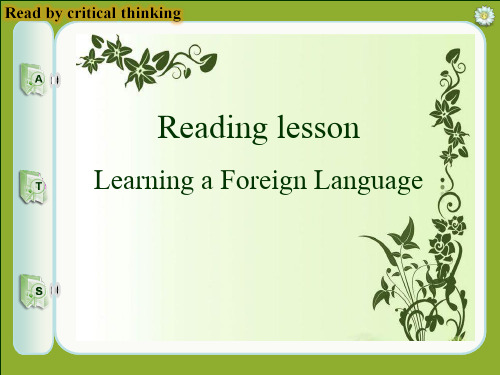
Do you think computer can help learn English?
Warm-up Words for discussion
to be faced with grammar rules
T
pronunciation vocabulary
cultural background
communicate with people exchange ideas with native people suitable for me Regular classroom study
Teaching Procedures
Warm-up
T
Global Reading
Detailed Reading
Homework
Why do you study English
Watch a Video
T
Warm-up
Discuss in pairs:
What problems do you have in trying to learn English in your middle school ?
positive adj.
① effective; helpful
Translation 别只是看着我,给我提些积极的建议吧。
T
Key
Don’t just watch me; give me some positive advice.
反义词
negative (消极的,负面的,否定的)
“worrying about making mistakes” 是现在分 词短语作状语 e.g.
T
Climbing to the top ofto the tower, When we climbed the top of the tower, we saw a beautiful sight. Not Because wanting he to meet John there, didn’t want to meet John there, he refused to attend the party.
unit 1 how to learn a foreign language
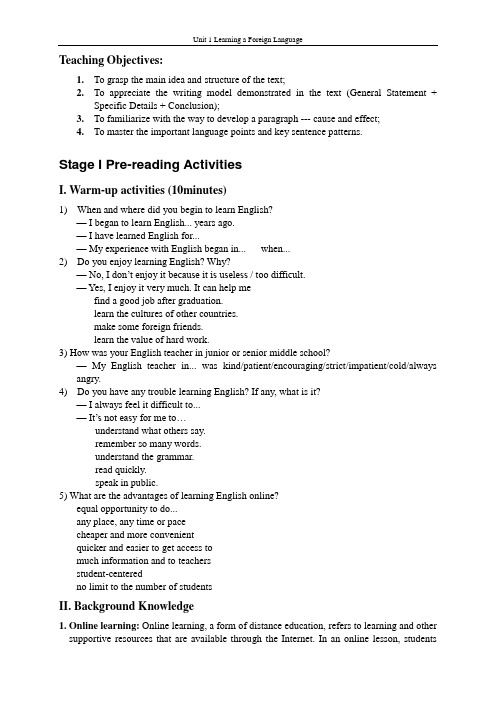
Teaching Objectives:1.To grasp the main idea and structure of the text;2.To appreciate the writing model demonstrated in the text (General Statement +Specific Details + Conclusion);3.To familiarize with the way to develop a paragraph --- cause and effect;4.To master the important language points and key sentence patterns.Stage I Pre-reading ActivitiesI. Warm-up activities (10minutes)1) When and where did you begin to learn English?— I began to learn English... years ago.— I have learned English for...— My experience with English began in... when...2) Do you enjoy learning English? Why?—No, I don’t enjoy it because it is useless / too difficult.— Y es, I enjoy it very much. It can help mefind a good job after graduation.learn the cultures of other countries.make some foreign friends.learn the value of hard work.3) How was your English teacher in junior or senior middle school?—My English teacher in... was kind/patient/encouraging/strict/impatient/cold/always angry.4) Do you have any trouble learning English? If any, what is it?— I always feel it difficult to...—It’s not easy for me to…understand what others say.remember so many words.understand the grammar.read quickly.speak in public.5) What are the advantages of learning English online?equal opportunity to do...any place, any time or pacecheaper and more convenientquicker and easier to get access tomuch information and to teachersstudent-centeredno limit to the number of studentsII. Background Knowledge1. Online learning: Online learning, a form of distance education, refers to learning and other supportive resources that are available through the Internet. In an online lesson, studentswork with a computer program to select the materials they should be studying. The materials can be presented as text, graphics, animated graphics, audio, video, or a combination of these that are displayed in Web browsers or other multimedia players such as Windows Media Player.2. Junior middle school: In the US,it refers to a school for children who are twelve to fifteen years old while in Britain it refers to a school for children aged seven to eleven years.3. Senior middle school: It refers to a stage of education after junior middle school and before college or university.4. Primary and secondary school:Begins around age six for US children. They attend five or six years of primary school. Next they go to secondary school, which consists of either a two-, three-year program or a four-year program. This is called “middle school” or “junior high school” and “senior high school “ (often just called “high school”).Stage II While-reading ActivitiesIII Global Reading1. Understanding the major details of the textMain idea of the textLearning a foreign language was one of the most rewarding experiences the writer has had. Organization of the textIntroductory remarks: The author presents readers with his own language learning experiences at different stages. And at different stages, the author met different teachers a nd consequently formed different attitudes towards English learning.1. Part Division of the TextPart I (1) Introduction Learning a foreign language was one of the most rewarding experiences the writer has had.Part II (2-7) The author’s four stages of learning the foreign language Language learning experiences from junior middle school to senior middle school to college and then to online learning. There is also comparison between traditional learning and online learning.I. In junior middle school (Para.2):The teacher: kind and patient, positive, often praising the studentsThe author: at the top of my class, eagerly answering all the questions, never worrying much about making mistakesII. In senior middle school (Para.3):The teacher: punishing quickly, pointing a long stick at us and shaking it up and down, shouting “No! No! No!”The author: losing my eagerness, losing my joy, losing my desireIII. At college (Para.4):The teacher: patient and kind, no pointed sticksThe classes: very large, many students spoke much better than I didThe author: feeling intimidated, afraid to speak, staying at the same levelIV. The on-line learning (Paras.5—7):The on-line learning requires: much time, commitment, disciplineThe author (at the beginning): making many mistakes, crying out of frustration, feeling like giving upThe author (finally): reaping the benefits of all the hard workPart III (8) Conclusion Summarizes the writer’s experiences in learning a foreign language. Through the learning process, the writer learned the value of hard work, gained insights into another culture, and opened his mind to new ideas.Four benefits:1. Teaching me the value of hard work.2. Giving me insights into another culture.3. Enabling me to communicate with more people.4. Being able to bridge the gap between my language and theirs2. Structure AnalysisA. The Writing Model of Passage A:General Statement + Specific Details + Conclusion1)What is the General Statement?2)What are the specific details?3)What is the conclusion?The General Statement (the Main Idea)Learning a foreign language was one of the most difficult yet most rewarding experiences of my life.(Para.1)The Specific DetailsEnglish Learning Experiences:Difficult : a. in senior middle school. (Para. 3)b. at college. (Para.4 )Rewarding :a. in junior middle school (Para. 2)b. with the online course. ( Paras.5—7 )ConclusionLearning a foreign language has been a most trying experience for me, but one that I wouldn’ t trade for anything. (Para. 8)B. The way to develop paragraphs: Cause and EffectTopic→Cause→EffectThe paragraph begins with a general statement about what is to be talked about. (Topic)Next comes the major factor or factors that result in the effect as expected. (Cause)As a conclusion, an effect shows what the cause or causes have produced on the concerned. (Effect)The cause and effect technique can make clear the reasons why something happens by showing the relation between cause and effect.List the cause and effect of Para. 2, 3, and 4.Para. 2 Cause: The kind and patient teacher often praised the students.Effect: I eagerly answered questions, not worrying about making mistakes. I was atthe top of my class.Para. 3 Cause: The new teacher quickly punished those who gave wrong answers.Effect: I lost my eagerness to answer questions and my desire to say anything inEnglish.Para. 4 Cause: Large classes made me only able to answer a couple of questions in each class period. Many students spoke much better than I did.Effect: I was afraid to speak. My English seemed to stay at the same level.Detailed Readingnguage Points(50minutes)Para. 11. rewardvt. to give something in return for good and valuable doingsreward sb. with sth.; reward sb. for sth/doing sth;Our hard work was finally rewarded. 在奥运会上的成功使他的努力得到了报偿。
怎样学好一门外语英语作文

How to learn a foreign language wellLearning a foreign language well requires time,patience and perseverance.Start by setting clear goals.Determine the level of foreign language you want to learn,such as being able to hold basic everyday conversations, read simple articles,or watch movies.Clear goals help you plan your study and stay motivated.Then make a study plan.In order to achieve the goal,we need to make a reasonable study plan.The plan should include daily or weekly study time,study content and method.Make sure the plan is both challenging and achievable.Second,listen and speak more.Improve listening and speaking skills by listening and speaking.You can listen to foreign language radio,watch foreign language movies and TV programs,or communicate with native speakers of the foreign language.Read and write more.Read foreign language articles and books to improve reading comprehension and vocabulary.Finally,keep practicing and keep a positive attitude.Learning a foreign language takes time and patience,so keep practicing.Even if you only study for a few minutes every day,stick to it.Keep a positive attitude and believe that you can succeed.Keep encouraging yourself and celebrate every step forward.翻译:怎样学好一门外语学好一门外语需要时间、耐心和恒心。
【英语作文】如何学习外语 How to Learn a Foreign Language
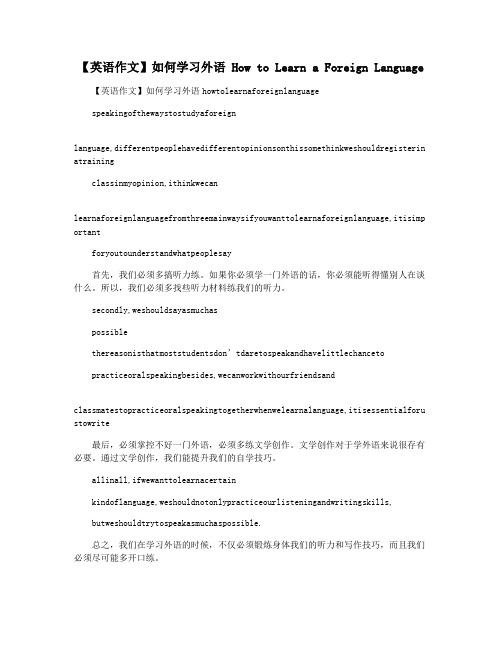
【英语作文】如何学习外语 How to Learn a Foreign Language 【英语作文】如何学习外语howtolearnaforeignlanguagespeakingofthewaystostudyaforeignlanguage,differentpeoplehavedifferentopinionsonthissomethinkweshouldregisterin atrainingclassinmyopinion,ithinkwecanlearnaforeignlanguagefromthreemainwaysifyouwanttolearnaforeignlanguage,itisimp ortantforyoutounderstandwhatpeoplesay首先,我们必须多搞听力练。
如果你必须学一门外语的话,你必须能听得懂别人在谈什么。
所以,我们必须多找些听力材料练我们的听力。
secondly,weshouldsayasmuchaspossiblethereasonisthat moststudentsdon’tdaretospeakandhavelittlechancetopracticeoralspeakingbesides,wecanworkwithourfriendsandclassmatestopracticeoralspeakingtogetherwhenwelearnalanguage,itisessentialforu stowrite最后,必须掌控不好一门外语,必须多练文学创作。
文学创作对于学外语来说很存有必要。
通过文学创作,我们能提升我们的自学技巧。
allinall,ifwewanttolearnacertainkindoflanguage,weshouldnotonlypracticeourlisteningandwritingskills,butweshouldtrytospeakasmuchaspossible.总之,我们在学习外语的时候,不仅必须锻炼身体我们的听力和写作技巧,而且我们必须尽可能多开口练。
大学英语精读预备级课文翻译(详细)
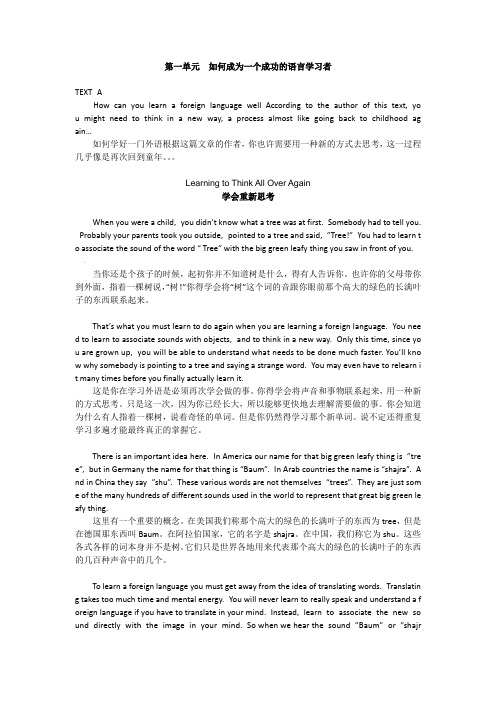
第一单元如何成为一个成功的语言学习者TEXT AHow can you learn a foreign language well According to the author of this text, yo u might need to think in a new way, a process almost like going back to childhood ag ain…如何学好一门外语根据这篇文章的作者,你也许需要用一种新的方式去思考,这一过程几乎像是再次回到童年。
Learning to Think All Over Again学会重新思考When you were a child, you didn’t know what a tree was at first. Somebody had to tell you. Probably your parents took you outside, pointed to a tree and said, ”Tree!” You had to learn t o associate the sound of the word “Tree” with the big green leafy thing you saw in front of you.、当你还是个孩子的时候,起初你并不知道树是什么,得有人告诉你。
也许你的父母带你到外面,指着一棵树说,“树!”你得学会将“树”这个词的音跟你眼前那个高大的绿色的长满叶子的东西联系起来。
That’s what you must learn to do again when you are learning a foreign language. You nee d to learn to associate sounds with objects, and to think in a new way. Only this time, since yo u are grown up, you will be able to understand what needs to be done much faster. You’ll kno w why somebody is pointing to a tree and saying a strange word. You may even have to relearn i t many times before you finally actually learn it.这是你在学习外语是必须再次学会做的事。
仁爱版英语九年级上册Unit-3-Topic-3测试题(含答案解析)
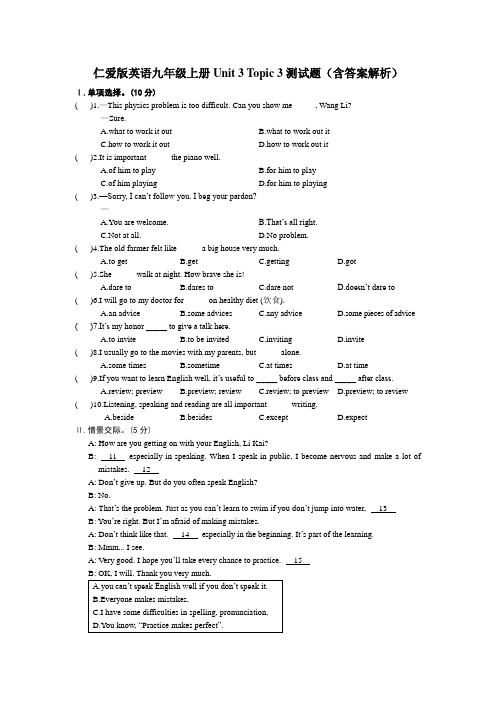
仁爱版英语九年级上册Unit 3 Topic 3测试题(含答案解析)Ⅰ.单项选择。
(10分)( )1.—This physics problem is too difficult. Can you show me _____, Wang Li?—Sure.A.what to work it outB.what to work out itC.how to work it outD.how to work out it( )2.It is important _____ the piano well.A.of him to playB.for him to playC.of him playingD.for him to playing( )3.—Sorry, I can’t follow you. I beg your pardon?—_____A.You are welcome.B.That’s all right.C.Not at all.D.No problem.( )4.The old farmer felt like _____ a big house very much.A.to getB.getC.gettingD.got( )5.She _____ walk at night. How brave she is!A.dare toB.dares toC.dare notD.doesn’t dare to ( )6.I will go to my doctor for _____ on healthy diet (饮食).A.an adviceB.some advicesC.any adviceD.some pieces of advice ( )7.It’s my honor _____ to give a talk here.A.to inviteB.to be invitedC.invitingD.invite( )8.I usually go to the movies with my parents, but _____ alone.A.some timesB.sometimeC.at timesD.at time( )9.If you want to learn English well, i t’s useful to _____ before class and _____ after class.A.review; previewB.preview; reviewC.review; to previewD.preview; to review ( )10.Listening, speaking and reading are all important _____ writing.A.besideB.besidesC.exceptD.expectⅡ.情景交际。
如何学习外语 How to Learn a Foreign Language_英语作文

如何学习外语How to Learn a Foreign LanguageSpeaking of the ways to study a foreignlanguage, different people have different opinions on this. Some believe weshould go to a certain country. Some think we should register in a trainingclass. Some think we should practice quite often. In my opinion, I think we canlearn a foreign language from three main ways.说起学一门外语,不同的人有不同的意见。
一些人认为我们应该去特定的国家学习。
一些人认为我们应该上培训班学习。
一些人认为我们应该经常练习。
就我来说,我认为学外语有三种主要的方法。
First of all, we should try to do manylistening practice. If you want to learn a foreign language, it is importantfor you to understand what people say. So, we should find many listeningmaterials to practice our listening skills.首先,我们应该多做听力练习。
如果你要学一门外语的话,你必须能够听懂别人在讲什么。
所以,我们应该多找些听力材料练习我们的听力。
Secondly, we should say as much aspossible. It is a common phenomenon that most students are poor in oral speaking.The reason is that most students don’t dare to speak and havelittle chance topractice oral speaking. However, if we learn a language, we must encourageourselves to say as much as possible. Besides, we can work with our friends andclassmates to practice oral speaking together.其次,我们应该多说。
learning_a_foreign_language
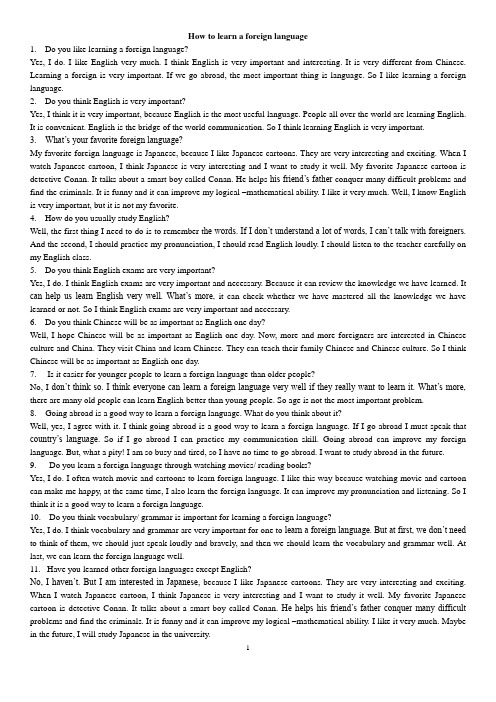
How to learn a foreign language1.Do you like learning a foreign language?Y es, I do. I like English very much. I think English is very important and interesting. It is very different from Chinese. Learning a foreign is very important. If we go abroad, the most important thing is language. So I like learning a foreign language.2.Do you think English is very important?Y es, I think it is very important, because English is the most useful language. People all over the world are learning English. It is convenient. English is the bridge of the world communication. So I think learning English is very important.3. What’s your favorite foreign language?My favorite foreign language is Japanese, because I like Japanese cartoons. They are very interesting and exciting. When I watch Japanese cartoon, I think Japanese is very interesting and I want to study it well. My favorite Japanese cartoon is detective Conan. It talks about a smart boy called Conan. He helps his friend’s father conquer many difficult problems and find the criminals. It is funny and it can improve my logical –mathematical ability. I like it very much. Well, I know English is very important, but it is not my favorite.4.How do you usually study English?Well, the first thing I need to do is to remember t he words. If I don’t understand a lot of words, I can’t talk with foreigners. And the second, I should practice my pronunciation, I should read English loudly. I should listen to the teacher carefully on my English class.5.Do you think English exams are very important?Y es, I do. I think English exams are very important and necessary. Because it can review the knowledge we have learned. It can help us learn English very well. What’s more, it can check whether we have mastered all the knowledge we have learned or not. So I think English exams are very important and necessary.6.Do you think Chinese will be as important as English one day?Well, I hope Chinese will be as important as English one day. Now, more and more foreigners are interested in Chinese culture and China. They visit China and learn Chinese. They can teach their family Chinese and Chinese culture. So I think Chinese will be as important as English one day.7. Is it easier for younger people to learn a foreign language than older people?No, I don’t think so. I think everyone can learn a foreign language very well if they really want to learn it. What’s more, there are many old people can learn English better than young people. So age is not the most important problem.8. Going abroad is a good way to learn a foreign language. What do you think about it?Well, yes, I agree with it. I think going abroad is a good way to learn a foreign language. If I go abroad I must speak that country’s language.So if I go abroad I can practice my communication skill. Going abroad can improve my foreign language. But, what a pity! I am so busy and tired, so I have no time to go abroad. I want to study abroad in the future.9.Do you learn a foreign language through watching movies/ reading books?Y es, I do. I often watch movie and cartoons to learn foreign language. I like this way because watching movie and cartoon can make me happy, at the same time, I also learn the foreign language. It can improve my pronunciation and listening. So I think it is a good way to learn a foreign language.10.Do you think vocabulary/ grammar is important for learning a foreign language?Y es, I do. I think vocabulary and grammar are very important for one to learn a foreign language. But at first, we don’t need to think of them, we should just speak loudly and bravely, and then we should learn the vocabulary and grammar well. At last, we can learn the foreign language well.11. Have you learned other foreign languages except English?No, I haven’t. But I am interested in Japanese, because I like Japanese cartoons. They are very interesting and exciting. When I watch Japanese cartoon, I think Japanese is very interesting and I want to study it well. My favorite Japanese cartoon is detective Conan. It talks about a smart boy called Conan. He helps his friend’s father conquer many difficult problems and find the criminals. It is funny and it can improve my logical –mathematical ability. I like it very much. Maybe in the future, I will study Japanese in the university.12. Can your parents speak a foreign language?Y es, they can. My mother told me that she have learned English in the middle school, the high school and the university. And my father has studied in Britain, so his English is very good. My parents all can speak English.。
HowtoLearnaForeignLanguage
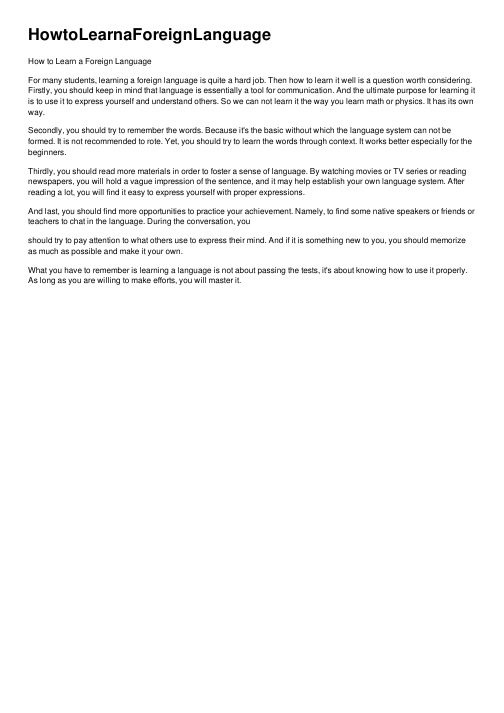
HowtoLearnaForeignLanguageHow to Learn a Foreign LanguageFor many students, learning a foreign language is quite a hard job. Then how to learn it well is a question worth considering. Firstly, you should keep in mind that language is essentially a tool for communication. And the ultimate purpose for learning it is to use it to express yourself and understand others. So we can not learn it the way you learn math or physics. It has its own way.Secondly, you should try to remember the words. Because it's the basic without which the language system can not be formed. It is not recommended to rote. Yet, you should try to learn the words through context. It works better especially for the beginners.Thirdly, you should read more materials in order to foster a sense of language. By watching movies or TV series or reading newspapers, you will hold a vague impression of the sentence, and it may help establish your own language system. After reading a lot, you will find it easy to express yourself with proper expressions.And last, you should find more opportunities to practice your achievement. Namely, to find some native speakers or friends or teachers to chat in the language. During the conversation, youshould try to pay attention to what others use to express their mind. And if it is something new to you, you should memorize as much as possible and make it your own.What you have to remember is learning a language is not about passing the tests, it's about knowing how to use it properly. As long as you are willing to make efforts, you will master it.。
如何学会一门外语英语作文
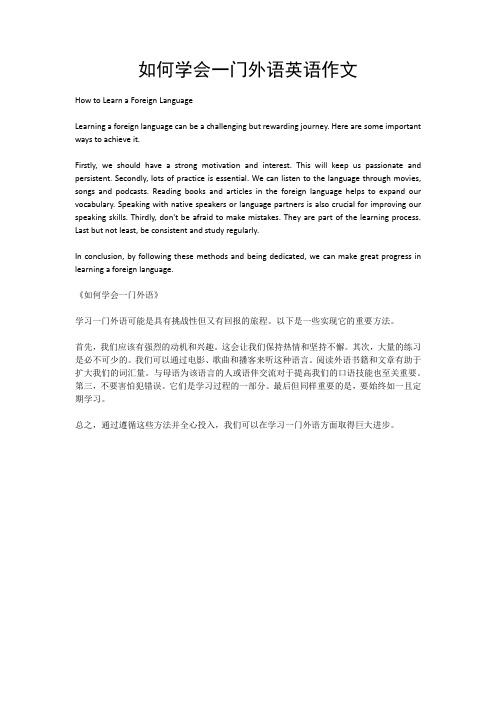
如何学会一门外语英语作文How to Learn a Foreign LanguageLearning a foreign language can be a challenging but rewarding journey. Here are some important ways to achieve it.Firstly, we should have a strong motivation and interest. This will keep us passionate and persistent. Secondly, lots of practice is essential. We can listen to the language through movies, songs and podcasts. Reading books and articles in the foreign language helps to expand our vocabulary. Speaking with native speakers or language partners is also crucial for improving our speaking skills. Thirdly, don't be afraid to make mistakes. They are part of the learning process. Last but not least, be consistent and study regularly.In conclusion, by following these methods and being dedicated, we can make great progress in learning a foreign language.《如何学会一门外语》学习一门外语可能是具有挑战性但又有回报的旅程。
怎样学好一门外语英语作文
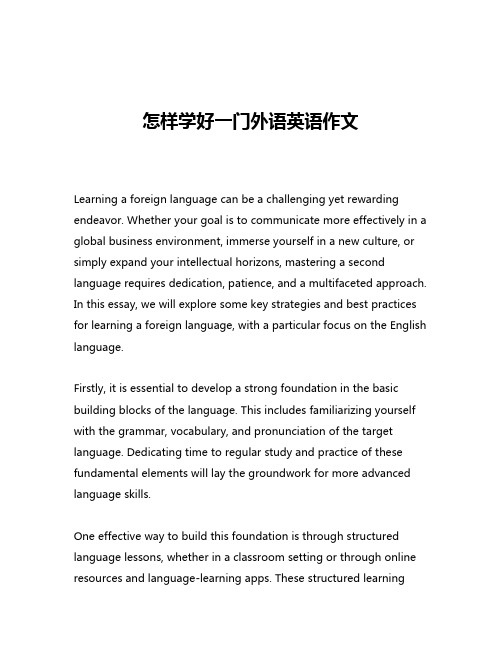
怎样学好一门外语英语作文Learning a foreign language can be a challenging yet rewarding endeavor. Whether your goal is to communicate more effectively in a global business environment, immerse yourself in a new culture, or simply expand your intellectual horizons, mastering a second language requires dedication, patience, and a multifaceted approach. In this essay, we will explore some key strategies and best practices for learning a foreign language, with a particular focus on the English language.Firstly, it is essential to develop a strong foundation in the basic building blocks of the language. This includes familiarizing yourself with the grammar, vocabulary, and pronunciation of the target language. Dedicating time to regular study and practice of these fundamental elements will lay the groundwork for more advanced language skills.One effective way to build this foundation is through structured language lessons, whether in a classroom setting or through online resources and language-learning apps. These structured learningenvironments provide a systematic approach to language acquisition, with a focus on gradually introducing new concepts and providing opportunities for application and reinforcement.In addition to formal lessons, immersing yourself in the language through various media can be incredibly beneficial. Listening to podcasts, watching movies or television shows, and reading books or news articles in the target language can help you become more comfortable with the flow and cadence of the language, as well as expose you to a diverse range of vocabulary and idiomatic expressions.Engaging in conversation practice is another crucial component of language learning. Seek out opportunities to converse with native speakers, whether through language exchange programs, online forums, or local community groups. These interactions not only help you improve your speaking and listening skills but also provide valuable insights into the cultural nuances and social contexts of the language.Furthermore, it is important to embrace the concept of "mistakes as opportunities." Language learning is a journey, and mistakes are a natural and inevitable part of the process. Rather than becoming discouraged by errors, view them as chances to learn and improve. Actively seek feedback from native speakers or language instructors,and use their guidance to refine your language skills.Another key strategy is to make the language a regular part of your daily life. Incorporate the language into your routine, whether by setting aside time for dedicated practice, using language-learning tools during your commute, or surrounding yourself with the language through music, social media, or other activities. Consistent exposure and practice are essential for developing fluency and confidence in the language.It is also important to tailor your learning approach to your personal learning style and preferences. Some individuals may thrive in a more structured, analytical approach, while others may prefer a more immersive, conversational method. Experiment with different techniques and resources to find what works best for you, and be willing to adjust your approach as your language skills progress.Additionally, setting achievable goals and tracking your progress can be highly motivating. Break down your language-learning journey into manageable milestones, such as mastering a specific grammar concept, expanding your vocabulary in a particular domain, or reaching a certain level of proficiency on a language proficiency test. Celebrate your successes along the way, and use them as motivation to continue your language-learning journey.Finally, it is crucial to maintain a positive and persistent attitude towards language learning. Mastering a foreign language takes time and effort, and there may be moments of frustration or discouragement. However, by embracing a growth mindset, staying motivated, and persevering through challenges, you can overcome these obstacles and ultimately achieve your language-learning goals.In conclusion, learning a foreign language, particularly English, requires a multifaceted approach that combines formal instruction, immersive exposure, conversational practice, and a positive, persistent attitude. By developing a strong foundation, embracing mistakes as opportunities, and tailoring your learning approach to your individual needs and preferences, you can unlock the many benefits of multilingualism and become a confident and proficient language learner.。
怎样学好外语啊英文作文
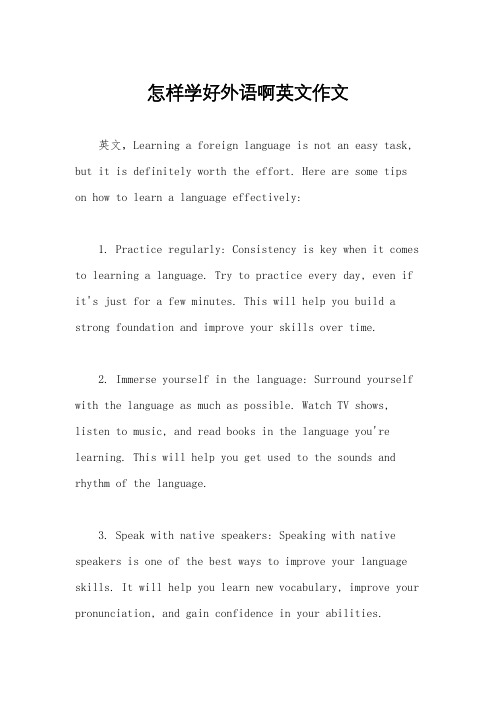
怎样学好外语啊英文作文英文,Learning a foreign language is not an easy task, but it is definitely worth the effort. Here are some tips on how to learn a language effectively:1. Practice regularly: Consistency is key when it comes to learning a language. Try to practice every day, even if it's just for a few minutes. This will help you build a strong foundation and improve your skills over time.2. Immerse yourself in the language: Surround yourself with the language as much as possible. Watch TV shows, listen to music, and read books in the language you're learning. This will help you get used to the sounds and rhythm of the language.3. Speak with native speakers: Speaking with native speakers is one of the best ways to improve your language skills. It will help you learn new vocabulary, improve your pronunciation, and gain confidence in your abilities.4. Set goals: Setting goals will help you stay motivated and focused. Whether it's to pass a language exam or to be able to have a conversation with a native speaker, having a clear goal in mind will help you stay on track.5. Be patient: Learning a language takes time and effort. Don't expect to become fluent overnight. Be patient with yourself and celebrate small victories along the way.中文:学习外语并不是一件容易的事情,但是它绝对值得我们付出努力。
How to Learn a Foreign Language如何学习一门外语

Spend the Time!By far the most important factor is how much time you spend.The more time you spend on the language,the faster you will learn.This means listening,reading,writing,speaking,and studying words and phrases.This does not mean sitting in class looking out the window,nor lis-tening to other students who do not speak well,nor getting explanations in your own language about how the language works.This means spending time enjoyably connected to the language you are learning.花时间,下功夫显然,最重要的因素就是你花了多少时间。
你花的时间越多,就学的越快。
这意味着你要听、读、写、说,以及学习单词和短语,而不是坐在课堂上看着窗外,不是听其他的同学说蹩脚的语言,也不是用自己的语言来解释你所学语言。
你要愉快地花时间与你所学的语言联系起来。
Listen and Read Every Day!Listen wherever you are on your MP3player.Read what you are listening to.Listen to and read things that you like,things that you can mostly understand,or even partly understand.If you keep listening and reading,you will get used to the language.One hour of listening or reading is more effective than many hours of class time.每天听和读带上你的MP3随时听,读你听到的内容。
2023年6月份四级英语试题

2023年6月份四级英语试题1.题目:What do you think of the relationship between computers and human beings?答案:I think the relationship between computers and human beings is complex. On the one hand, computers provide convenience and efficiency in many aspects of life, such as work, study, and entertainment. On the other hand, computers also pose challenges, such as the problem of information security and the impact of computer diseases on human health. Therefore, we should make full use of computers to promote social progress while also paying attention to preventing and controlling potential risks.2.题目:What are the advantages and disadvantages of social media?答案:The advantages of social media include convenient communication, information sharing, and social networking. People can connect with others quickly and share information, ideas, and interests. However, the disadvantages include the spread of false information, privacy concerns, and addiction to social media. In addition, social media can also lead to unrealistic comparisons and body image issues among young people. Therefore, we should make wise use of social media while also being aware of its potential risks.3.题目:What is the significance of learning English?答案:Learning English is of great significance. Firstly, it is a necessary skill for global communication, allowing us to understand and interact with people from different cultures and backgrounds. Secondly, English is the language of international business and trade, which can help us expand our career opportunities. Finally, through learning English, we can gain a deeper understanding of Western culture, which can help us improve our thinking ability and creativity.4.题目:What are the causes of stress among college students?答案:The causes of stress among college students are various. Firstly, they may face academic pressure, including exams, papers, and research projects. Secondly, they may encounter social pressure, such as making friends, finding a boyfriend/girlfriend, and participating in social activities. Additionally, some students may suffer from family pressure or emotional problems. To cope with stress, college students should maintain a positive attitude, seek help when necessary, and engage in relaxation activities such as exercise or meditation.5.题目:How can we solve the problem of air pollution?答案:There are several ways to solve the problem of air pollution. Firstly, government agencies should strengthen environmental protection laws and regulations to reduce emissions from factories and vehicles. Secondly, individuals can take actions such as using public transportation or cycling to reduce individual car use. Additionally,planting more trees can absorb carbon dioxide and other greenhouse gases in the air. We should also raise public awareness of environmental protection and promote sustainable development to protect our planet.6.题目:What is the best way to learn a foreign language?答案:The best way to learn a foreign language is to immerse oneself in the language environment. This means exposure to the language through listening, speaking, reading, and writing in real-life situations as much as possible. Additionally, regular practice is essential to retain knowledge and improve skills. Learning with a tutor or through online resources can provide structure and assistance, but ultimately, learning a language requires effort and dedication on the part of the learner.7.题目:What are the benefits of exercise?答案:Exercise has numerous benefits for physical and mental health. It can improve cardiovascular health, strengthen muscles and bones, reduce stress and anxiety levels, increase energy levels, and improve sleep quality. Exercise can also help with weight control and prevent chronic diseases such as diabetes and arthritis. Additionally, exercise can improve self-esteem and provide a sense of accomplishment and well-being. Regular exercise is essential for maintaining good health and preventing lifestyle diseases.8.题目:What is the most important quality for success?答案:The most important quality for success is perseverance. With perseverance, individuals stay focused and committed to their goals despite challenges and setbacks. They don't give up easily but keep pushing forward until they achieve their desired results. Alongside perseverance, other important qualities include self-discipline, hard work, resilience, adaptability, creativity, intelligence, and positive mindset. However, without perseverance, it is difficult to achieve long-term success in any field.。
大学教育Howtolearnaforeignlanguagewell91851453984659

With the acceleration of economic globalization, many times a language has been far from enough, so many people are beginning to learn a foreign language. Nevertheless, if you want to learn a foreign language well, it is not casually can be successful.
First of all, you need to increase vocabulary. Language is like a talent, and merely we have enough input to have the ability to output it. If your vocabulary is not enough, is difficult to express your meaning clearly.
大学优秀作文精编
918514_53984659号
题目要求:
How to lose weight? How to make good friends? How to learn a foreign language well?
Please choose any one of the three topics to make an essay with the words of about 150.
Language learning requires patience and accumulation, and you are supposed to insist on learning to really master this language.
- 1、下载文档前请自行甄别文档内容的完整性,平台不提供额外的编辑、内容补充、找答案等附加服务。
- 2、"仅部分预览"的文档,不可在线预览部分如存在完整性等问题,可反馈申请退款(可完整预览的文档不适用该条件!)。
- 3、如文档侵犯您的权益,请联系客服反馈,我们会尽快为您处理(人工客服工作时间:9:00-18:30)。
1.How to Learn a Foreign Language through Translation
Every man who rises above the common level has received two educations: the first from his teachers; the second, more personal and important, from himself….
In my French and Latin translations I adopted an excellent method, which, from my own success, I would recommend to the imitation of students.
I chose some classic writers, such as Cicero and Vertot, the most approved for purity and elegance of style.
I translated, for instance, an epistle of Cicero into French; and, after throwing it aside till the word and phrases were obliterated from my memory, I retranslated my French into such Latin as I could find;
and then compared each sentence of my imperfect version with the ease, the grace, the propriety of the Roman orator.
A similar experiment was made on several pages of the Revolutions of Vertot; I turned them into Latin, returned them after a sufficient interval into my own French, and again scrutinized the
resemblance or dissimilitude of the copy and the original.
By degrees I was less ashamed, by degrees I was more satisfied with myself; and I persevered in the practice of these double translations, which filled several books, till I had acquired the knowledge of both idioms, and the command at least of a correct style.
This useful exercise of writing was accompanied and succeeded by the more pleasing occupation of reading the best authors. The perusal of the Roman classics was at once my exercise and reward. (Edward Gibbon)
This useful exercise of writing was accompanied and succeeded是不是可以理解成是
This useful exercise of writing was accompanied and was succeeded省略了was。
背景介绍:
爱德华·吉朋(1737-1794),英国18世纪最著名的历史学家,其著作品《罗马帝国衰亡史》(The History of the Decline and Fall of the Roman Empire (1776-1788)),一直被看作西方历史学和文学的经典之作。
他介绍的通过翻译学习外语的方法,相信对广大翻译学习者都有借鉴意义。
